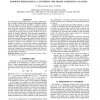Free Online Productivity Tools
i2Speak
i2Symbol
i2OCR
iTex2Img
iWeb2Print
iWeb2Shot
i2Type
iPdf2Split
iPdf2Merge
i2Bopomofo
i2Arabic
i2Style
i2Image
i2PDF
iLatex2Rtf
Sci2ools
176
click to vote
ICASSP
2010
IEEE
2010
IEEE
Modified hierarchical clustering for sparse component analysis
The under-determined blind source separation (BSS) problem is usually solved using the sparse component analysis (SCA) technique. In SCA, the BSS is usually solved in two steps, where the mixing matrix is estimated in the first step, while the sources are estimated in the second step. In this paper we propose a novel clustering algorithm for estimating the mixing matrix and the number of sources, which is usually unknown. The proposed algorithm is based on incorporating a statistical test with a hierarchical clustering (HC) algorithm. The proposed algorithm is based on sequentially extracting compact clusters that have been constructed by the HC algorithm, where the extraction decision is based on the statistical test. To identify the number of sources, as well as the clusters corresponding to the columns of the mixing matrix, we develop a quantitative measure called the concentration parameters. Two numerical examples are presented to present the ability of the proposed algorithm in ...
Related Content
| Added | 17 May 2011 |
| Updated | 17 May 2011 |
| Type | Journal |
| Year | 2010 |
| Where | ICASSP |
| Authors | Nasser Mourad, James P. Reilly |
Comments (0)

